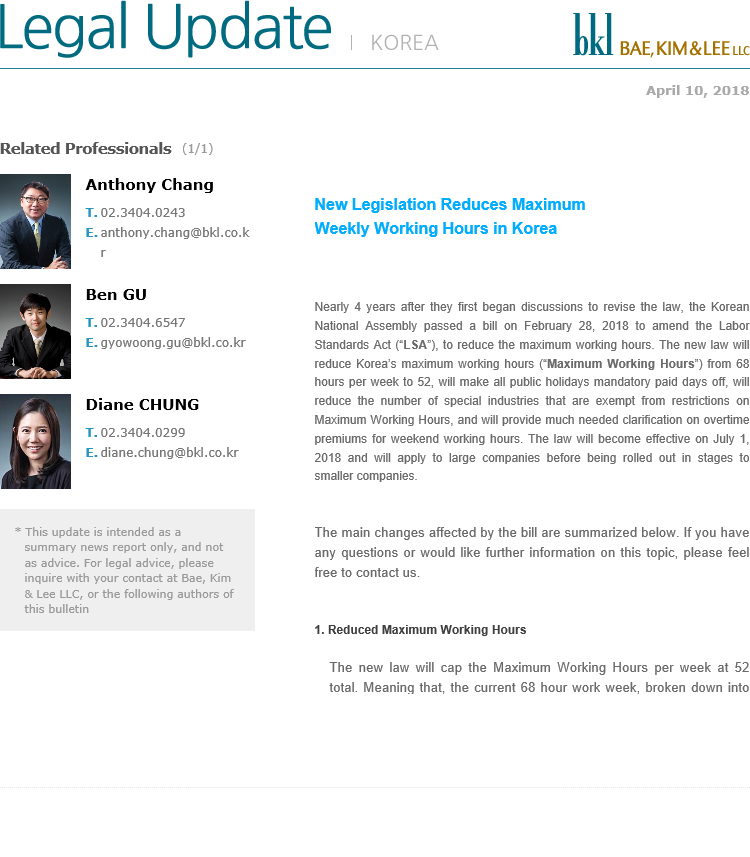[법무법인(유한) 태평양] New Legislation Reduces Maximum Weekly Working Hours in Korea
페이지 정보
작성일18-04-12 17:54관련링크
본문

New Legislation Reduces Maximum
Weekly Working Hours in Korea
Nearly 4 years after they first began discussions to revise the law, the Korean National Assembly passed a bill on February 28, 2018 to amend the Labor Standards Act (“LSA”), to reduce the maximum working hours. The new law will reduce Korea’s maximum working hours (“Maximum Working Hours”) from 68 hours per week to 52, will make all public holidays mandatory paid days off, will reduce the number of special industries that are exempt from restrictions on Maximum Working Hours, and will provide much needed clarification on overtime premiums for weekend working hours. The law will become effective on July 1, 2018 and will apply to large companies before being rolled out in stages to smaller companies.
The main changes affected by the bill are summarized below. If you have any questions or would like further information on this topic, please feel free to contact us.
1. Reduced Maximum Working Hours
The new law will cap the Maximum Working Hours per week at 52 total. Meaning that, the current 68 hour work week, broken down into 40 hours for regular work, 12 hours for overtime work, and 16 hours for holiday (weekend) work, will no longer be permitted.

2. Mandatory Paid Days Off for Public Holidays
To date, paid days off for public holidays were not a legal requirement for private employers, although practically, most private employers offered such paid holidays. Only Labor Day (May 1st) and the weekly paid holiday (usually, designated as Sunday) were mandatory requirements. However, this new law will now make public holidays mandatory paid days off for private employers. The new law will provide some flexibility for employers. With the agreement of employees, employers may arrange for employees to take alternative days off in lieu of public holidays.
Some labor unions argue that, even if public holidays fall on weekdays, weekly overtime working hours cannot exceed 12 hours. However, this is simply an inaccurate understanding. The Supreme Court defines working hours as “actual” time used by employees to perform work/duties, as stipulated in their employment agreement, under the direction and supervision of the employer. Paid days off should not be counted towards the weekly Maximum Working Hours. In a similar case, the Ministry of Employment & Labor (“MOEL”) determined that where the weekly working hours did not exceed the maximum due to a public holiday falling on a weekday, overtime was not applicable to work performed up to 8 hours on a Saturday.

3. Reduced Number of Special Industries
The new law will reduce the number of special industries enumerated under the LSA (“Special Industries”) in which employers are permitted to have employees work in excess of the Maximum Working Hours. The current 26 Special Industries will be cut down to just 5 industries as listed below. Employers who fail to comply with this new rule will be subject to criminal penalties of imprisonment for up to two years or a fine of up to KRW 20 million.
Current Special Industries | New Law (Effective Date: July 1, 2019) |
1. Transportation services, consumer goods sales, storage services, financial and insurance services; 2. Film production and entertainment, broad-casting, educational research, advertising; 3. Medical and sanitation services, hotel and restaurant services, incineration and cleaning services, beauty salons and barbershops; and 4. Social welfare. | 1. Land Transportation (excluding public transport bus services) and pipeline transportation; 2. Water transportation; 3. Air transportation; 4. Other transportation support services; and 5. Healthcare. |
4. Holiday Work Performed Up to 8 Hours
Due to the controversial interpretations by the lower courts and the MOEL, there have long been questions on whether employees who performed work up to 8 hours per day on weekends would be entitled to only the holiday premium of 50% of ordinary wages or entitled to both holiday and overtime premiums amounting to 100%. However, the new law is set to clear this up. Under the new law, employees will be paid additional 50% of their ordinary wages for work performed up to 8 hours per day on a holiday.
5. Reduced Maximum Working Hours for Minors
The new law will reduce the Maximum Working Hours for minors (ages 15 to 18) from 46 hours per week to 40.
6. Effective Date
The new law will become effective in stages based on employer size, with the first changes taking effect on July 1, 2018 for employers with 300 or more employees.

7. Fixed-Allowance System for Overtime Work
Now that many employers have adopted a fixed-allowance system (approximately 45.4% according to MOEL surveys) in which a predetermined amount of overtime pay is built into the employment contracts or rules of employment, there is concern as to whether the new law will be able to effectively reduce working hours in Korea. To address such concerns, MOEL plans to announce a new policy based on Korean Supreme Court precedents to provide more regulatory guidance on the fixed-allowance system. Employers who currently implement the fixed-allowance system should pay attention to these changes as they become available.
※ BKL will be holding a HR seminar focused on the fixed-allowance system for overtime work as soon as the new regulatory guidance is promulgated. The schedule for the seminar will be announced soon. Please come and join us for the seminar.


